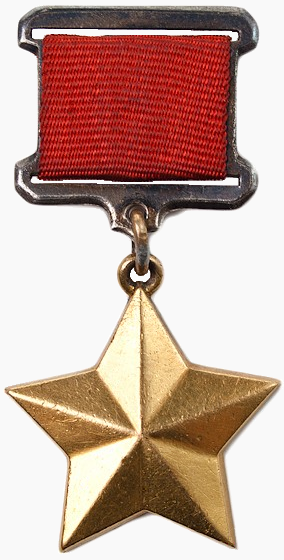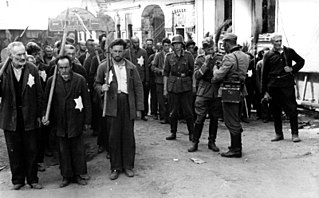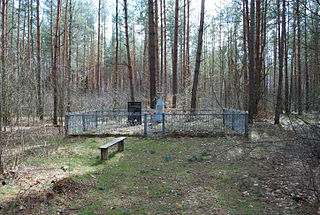Ukrainian partisans may refer to:
- Ukrainian Insurgent Army during World War II
- Soviet partisans in Ukraine during World War II
- Ukrainian resistance during the Russian invasion of Ukraine
Ukrainian partisans may refer to:
Partisan may refer to:
A Soviet republic, a republic ruled by soviets, may refer to one of the following:

The title Hero of the Soviet Union was the highest distinction in the Soviet Union, awarded together with the Order of Lenin personally or collectively for heroic feats in service to the Soviet state and society.

The Ukrainian Insurgent Army was a Ukrainian nationalist paramilitary and partisan formation founded by the Organisation of Ukrainian Nationalists on October 14, 1942. During World War II, it was engaged in guerrilla warfare against the Soviet Union, Nazi Germany and both the Polish Underground State and Communist Poland.
Soviet partisans were members of resistance movements that fought a guerrilla war against Axis forces during World War II in the Soviet Union, the previously Soviet-occupied territories of interwar Poland in 1941–45 and eastern Finland. The activity emerged after Nazi Germany's Operation Barbarossa was launched from mid-1941 on. It was coordinated and controlled by the Soviet government and modeled on that of the Red Army.
Edelweiss is a European mountain flower.

A partisan is a member of an irregular military force formed to oppose control of an area by a foreign power or by an army of occupation by some kind of insurgent activity.

The German invasion of the Soviet Union started on 22 June 1941 and led to a German military occupation of Byelorussia until it was fully liberated in August 1944 as a result of Operation Bagration. The western parts of Byelorussia became part of the Reichskommissariat Ostland in 1941, and in 1943, the German authorities allowed local collaborators to set up a regional government, the Belarusian Central Rada, that lasted until the Soviets reestablished control over the region. Altogether, more than 2 million people were killed in Belarus during the three years of Nazi occupation, almost a quarter of the region's population, including 500,000 to 550,000 Jews in the Holocaust in Belarus.

The history of the Jews during World War II is almost synonymous with the persecution and murder of Jews which was committed on an unprecedented scale in Europe and European North Africa. The massive scale of the Holocaust which happened during World War II greatly affected the Jewish people and world public opinion, which only understood the dimensions of the Final Solution after the war. The genocide, known as HaShoah in Hebrew, aimed at the elimination of the Jewish people on the European continent. It was a broadly organized operation led by Nazi Germany, in which approximately six million Jews were murdered methodically and with horrifying cruelty. Although the Holocaust was organized by the highest levels of the Nazi German government, the vast majority of Jews murdered were not German, but were instead residents of countries invaded by the Nazis after 1938. Of the approximately 6 million Jews murdered by the Nazis, approximately 160,000 to 180,000 were German Jews. During the Holocaust in occupied Poland, more than one million Jews were murdered in gas chambers of the Auschwitz concentration camp alone. The murder of the Jews of Europe affected Jewish communities in Albania, Austria, Belarus, Belgium, Bosnia & Herzegovina, Channel Islands, Croatia, Czech Republic, Estonia, France, Germany, Greece, Hungary, Italy, Latvia, Libya, Lithuania, Luxembourg, Moldova, the Netherlands, North Macedonia, Norway, Poland, Romania, Russia, Serbia, Slovakia, and Ukraine.
Medvedev and female Medvedeva (Медве́дева), from Russian medved’ (медве́дь), meaning the animal "bear", are Slavic surnames. Notable bearers of the name include:

World War II in the Kingdom of Yugoslavia began on 6 April 1941, when the country was invaded and swiftly conquered by Axis forces and partitioned among Germany, Italy, Hungary, Bulgaria and their client regimes. Shortly after Germany attacked the USSR on 22 June 1941, the communist-led republican Yugoslav Partisans, on orders from Moscow, launched a guerrilla liberation war fighting against the Axis forces and their locally established puppet regimes, including the Axis-allied Independent State of Croatia (NDH) and the Government of National Salvation in the German-occupied territory of Serbia. This was dubbed the National Liberation War and Socialist Revolution in post-war Yugoslav communist historiography. Simultaneously, a multi-side civil war was waged between the Yugoslav communist Partisans, the Serbian royalist Chetniks, the Axis-allied Croatian Ustaše and Home Guard, Serbian Volunteer Corps and State Guard, Slovene Home Guard, as well as Nazi-allied Russian Protective Corps troops.
Kolpak may refer to:

The National Museum of the History of Ukraine in the Second World War is a memorial complex commemorating the German-Soviet War located in the southern outskirts of the Pechersk district of Kyiv, the capital of Ukraine, on the picturesque hills on the right-bank of the Dnipro River.

The Parczew partisans were fighters in irregular military groups participating in the Jewish resistance movement against Nazi Germany and its collaborators during World War II. The name of the partisan force, coined by the Holocaust historians, is borrowed from the Parczew forest located a short distance away from Lublin, halfway to the town of Sobibór, the location of the Sobibór extermination camp during the Holocaust in occupied Poland. The Jews who managed to escape from the camp hid in there along with the considerable number of Jewish families of the Lublin Ghetto.
The Nagykanizsa–Körmend offensive carried out between 26 March and 15 April 1945 was part of the 3rd Ukrainian Front's Vienna offensive during World War II against the Army Group South forces defending the Kisbajom–Nagykorpád–Nagyatád–Heresznye defensive line north of the Drava river and west of Lake Balaton.

Anti-Soviet partisans may refer to various resistance movements that opposed the Soviet Union and its satellite states at various periods during the 20th century.

The Order of Bohdan Khmelnitsky was a Soviet award named after Bohdan Khmelnytsky, Hetman (leader) of the Ukrainian Cossack Hetmanate The award was first established on October 10, 1943, by the Presidium of Supreme Soviet of the USSR during World War II. It was the only Red Army award to be written in the Ukrainian language.

The Parośla I massacre was committed during World War II by the Ukrainian Insurgent Army (UPA) under the command of Hryhorij Perehijniak "Dowbeszka-Korobka" on 9 February 1943 against the ethnic Polish residents of the village of Parośla in the Nazi-controlled Reichskommissariat Ukraine. It is considered a prelude to the ethnic cleansing of Poles in the Volhynia region by the UPA, and is recognized as the first mass murder committed by the Ukrainian Insurgent Army in the area. Estimates of the number of victims range from 149 to 173.

The 62nd Infantry Division was an infantry division of the German Heer during World War II. It was formed in Wehrkreis VIII (Silesia) in August 1939. After heavy casualties in March 1944, it was first briefly reassembled in August 1944 and then reorganized into the 62nd Volksgrenadier Division, formed from units assembled for the planned 583rd Volksgrenadier Division, on 22 September 1944. The dissolution of 62nd Infantry Division was declared on 9 October 1944. 62nd Volksgrenadier Division remained operational until it was trapped in the Ruhr Pocket and forced to surrender by American forces in April 1945.
The 367th Infantry Division was a German infantry division in World War II.